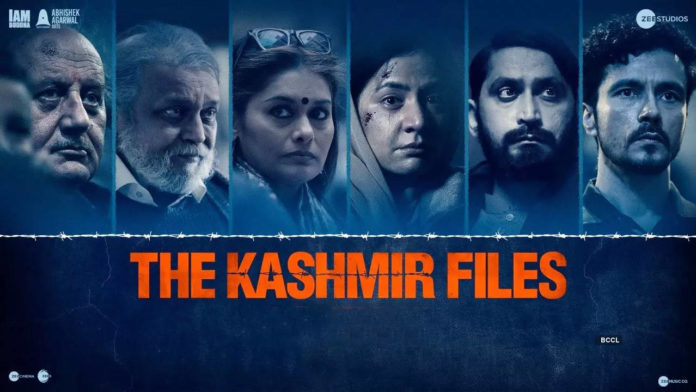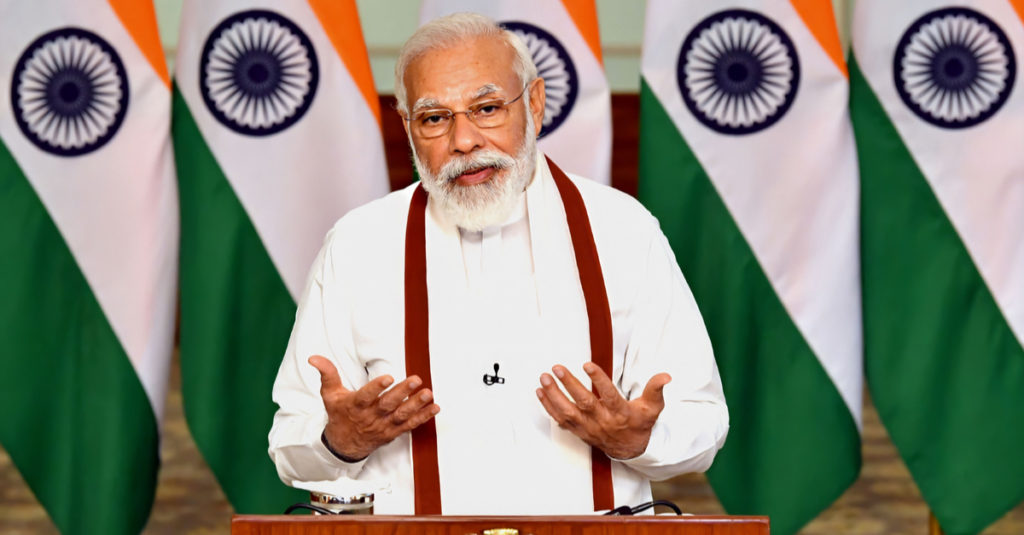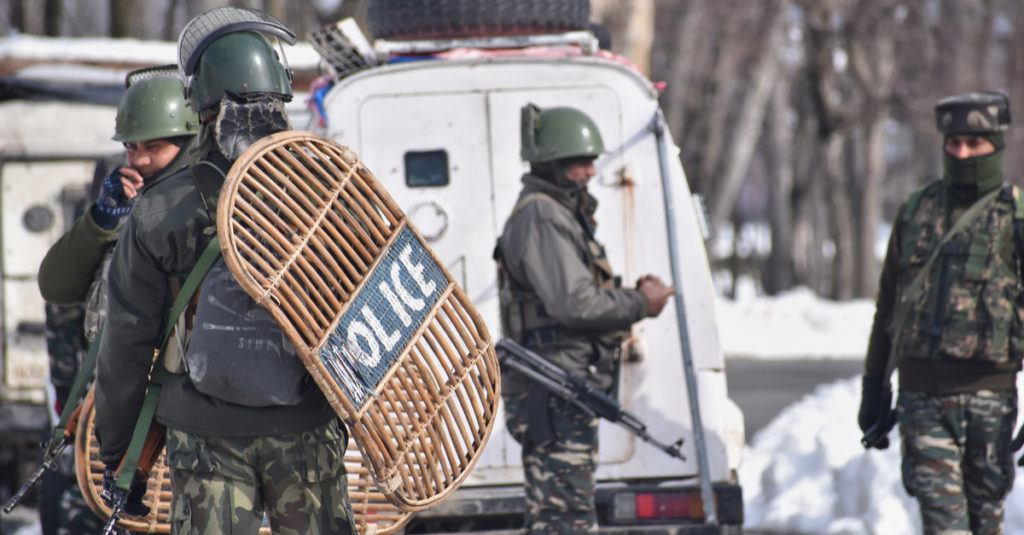
Sajad Rasheed, a scholar specialising in modern Kashmir history, reviews the Hindu nationalist propaganda movie The Kashmir Files.
Amid the high decibel prime time television debates about halal meat food chains in India, I was alerted to a phone notification regarding a massive box-office Bollywood movie The Kashmir Files. Even before this, a friend mentioned this movie to me, with concern, but it didn’t interest me at that time. But eventually I decided to satisfy the cat’s curiosity and watched it for more than two hours.
Indian Prime Minister Narendra Modi has not just patronised the movie but has also insisted that every Indian should watch it to know the plight of Kashmiri Hindu pundits. The movie has been made tax-free in most of the right-wing BJP ruled states and sometimes with free tickets to cinemas.
Is this a sudden, spontaneous new-found love or some ideological capital yielding political results? A cursory look at role of entertainment in informing the soft power of any nation is enough to tell us that the cultural production is often the most abominable form of propaganda dished out to satiate national interests. And this movie, with all the nationalist frenzy that it has whipped up in mainland India, is one such classic case.
Kashmiri Pundits
I will be briefly shedding light on some of the important moments in the film so that emotionally turbocharged cinematic script doesn’t bury the truth.
Watched keenly, there is one important thing which appears missing in this movie, which is that the entire narrative of the film is an adaptation of the book – My Frozen Turbulence in Kashmir – written by former Indian appointed administrator of Kashmir Jagmohan, who was at the helm of affairs in Kashmir in 1990 when Kashmiri Pundits were deceitfully made to leave the valley on the pretext of containing local militancy in Kashmir.
Subscribe to our newsletter and stay updated on the latest news and updates from around the Muslim world!
The Pundit community was made a scapegoat in a grand game of realpolitik hatched by Jagmohan in connivance with New Delhi. Despite the movie set in such a polarised backdrop by a communal figure, it has carefully evaded any mention of Jagmohan till the fall of curtains.
The movie begins with a cricket match in which Kashmiri Muslims are shown chanting slogans against Kashmiri pundits and in favour of Pakistan. In India, sports is a uniting thread for an ethnically diverse population, who barely have things in common except the emotive national symbols of which cricket is an essential part. The depiction of a cricket match as a battle ground for war cry against pundits is a potent tool for domestic political consumption in the electoral ball game in India.

Since 1947, this is no hidden fact that Kashmiris have kept cheering for Pakistan in cricket matches but never has it been against Kashmiri pundits, a community with which they have lived harmoniously together for centuries. But in majoritarian politics, otherisation is an instrument of victory and even better when the eighty percent of Hindu population views Muslims as invaders. As I am writing this, almost 40 houses and businesses of Muslims have been burned and looted in Madhya Pradesh by right-wing Hindu mobs.
The movie’s main protagonists Pushkar Nath (Anupam Kher) and Krishna Pundit (Darshan Kumar) share an intense screen presence. For the uninitiated, Anupam Kher, Bollywood actor, is unabashedly the hardcore supporter of right wing Indian Prime Minister Narendra Modi. Pushkar Nath, a Kashmiri pundit, is shown as victim whose community members were killed by Kashmiri Muslims and that Muslims made them flee their homes. He is shown as deeply wedded with the idea that article 370 should be removed in Kashmir which will pave way for Kashmiri Pundits to return home.
This depiction at face value demands empathy, but if history of Kashmir is probed further, it is well documented that it was Kashmiri Pundit community that had influenced Dogra king in 1920’s to initiate such a scheme of law. Historically, in Kashmir, the pundit community was always in the higher echelons of power, bureaucracy and education but when pundits saw Kashmiri Muslims getting educated at Aligarh Muslim University and returning enlightened, this threatened the hegemony of Kashmiri pundits.
And also because Kashmir was the gateway of trade and commerce to south Asia, all Indian Muslim merchants would pass through Kashmir, the fear that Indian Muslims might settle down in Kashmir gave birth to the insecurities of Kashmiri Pundits and this is precisely why they asked for such a law in the first place. This debunks the movie’s argument that article 370 somehow favoured Kashmiri Muslims and was an impediment in way of return of Kashmiri pundits. You cant have the cake and eat it too!
RSS speech
Krishna Pundit’s speech at a university in New Delhi is the main crux of the movie. The speech is basically a reflection of RSS, a right-wing Hindu supremacist organisation, which is also the parent party of ruling Indian government, concocted narrative on and about Kashmir. Amidst the background slogans of “freedom,” the protagonist is asked to share his experience about Kashmir from were he had returned.
He starts his speech by talking how name Kashmir was given by pundits and how all scientific research was initiated in Kashmir by Kashmiri Pundits, whom he calls scholars. While someone from the audience shouts that its just mythology, the protagonist retorts how Muslims were invaders in Kashmir and to only destroy the idols of Kashmiri Pundits and also how pundits were converted to Muslims by force and compulsion.
The underlying subtext of the speech is far more important which is that conversion of pundits was done by Muslim sufis in Kashmir. Highlighting this is important because RSS considers presence of Muslims, moderate or conservative, an anathema to their expansionist project of Hindu Rashtra. While the students hear patiently, the hyper-masculinity of the protagonist moves towards a popular slogan – convert, run or die – which RSS has used to a tremendous effect to generate hostility against Muslims and it’s a card that is being played again and again in Indian elections. The fact is despite Hindus leaving Kashmir, their temples are still intact and Muslims have taken care of them, as a rich heritage of pundits, while they have been gone.

Also, more than 5,000 pundit families did not leave Kashmir despite grave provocations by the administration, and are still living here, and they were neither converted nor killed. Despite the daily violence in Kashmir, both communities continue to live together while providing no space for fabricated stories.
Another important part that is straight from the text book of states legitimacy to violence is the interview of another protagonist “Chinmay Mandekar aka Bitta Karate” in which he is shown as confessing to killing of more than 40 Kashmiri Pundits. It begs the question, who was bitta karate in Kashmir? He was a local Kashmiri who like many Kashmiris joined armed rebellion in Kashmir in early 1990 against Indian rule in Kashmir. As it happens in any armed rebellion, some favour material or mettle and same happened with this man and later on he reneged and joined hands with Indian administration. The interview that he gave was staged at gun point much like the interview of Afzal Guru. On the contrary, he has killed dozens of Kashmiri Muslims since the militancy erupted in Kashmir.
The movie has essentially tried to frame Kashmiri Muslims as a community that was hand in glove with the terrorists for ensuring the departure of Kashmiri Pundits from the valley, which is a grand narrative of RSS. Is it a coincidence that film makers portrayal of Kashmiris aligns with the ruling party of India? Absolutely not.
If the purpose of the movie was to highlight the suffering of Kashmiri Pundits then it would have definitely probed the question that if successive Indian clients have ruled Kashmir and that too with the world’s largest military presence, why were Kashmiri pundits not settled back in Kashmir by successive political regimes? Of course, that would have meant raising questions on the rulers of the day, who nobody in dares to offend.
After the movie was released, Kashmir’s police, which directly functions under Indian command, said that total 196 Kashmiri pundits were killed which also debunks the myth of genocidal accusations against Kashmiri Muslims as a community. What this movie has successfully done is that it has dished out a deceitful, visualised fodder of trauma to right-wing Hindu nationalists who would reap election dividends from it.





















